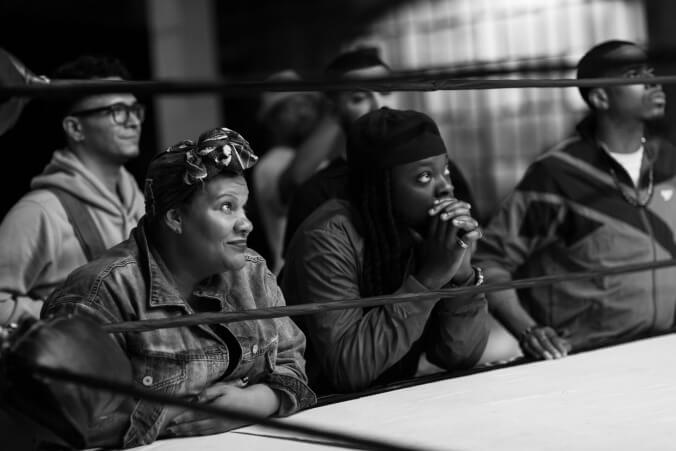The Oscars will likely snub The Forty-Year-Old Version, a comedy about how Black female artists get snubbed

Last year was an amazing year for Black female filmmakers. Before the pandemic hit, Stella Meghie’s love story The Photograph opened in theaters across the country. Not long after, Tayarisha Poe’s Selah And The Spades hit Amazon Prime, while Channing Godfrey Peoples’ Miss Juneteenth went out virtually. Maïmouna Doucouré raised a ruckus when her controversial coming-of-age tale, Cuties, dropped on Netflix, the same streaming service that gave us Gina Prince-Bythewood’s ass-kicking actioner The Old Guard. And Garrett Bradley directed one of the best documentaries of the year, Time. (It’s a shame we didn’t get Nia DaCosta’s much-anticipated Candyman reboot, which was slated for 2020 but is now scheduled to open this August.)
At the moment, all eyes are on Regina King, the Oscar-winning actor who made her directorial debut last year with One Night In Miami…, based on Kemp Powers’ play about what possibly transpired the night Muhammad Ali, Malcolm X, Jim Brown, and Sam Cooke all got together at a Miami hotel in 1964. King has already been nominated for a Golden Globe for Best Director, alongside fellow female nominees Emerald Fennell (Promising Young Women) and Chloé Zhao (Nomadland). If she gets nominated for a Best Director Oscar, she would be the first Black female filmmaker to do so. In all likelihood, that will happen, and Oscar voters will pat themselves on the back for finally putting a sista (sorry, Ava!) on the ballot. But in a perfect world, more than one melanin-enhanced lady could get nominated in the same year–or at least be in contention for a nomination, especially when the year in question boasted so many strong films from Black women.
Besides Miami, all of the aforementioned movies (and their filmmakers) will probably be overlooked by the Academy, because their distributors aren’t running in-your-face, for-your-consideration campaigns, and because voters may be just too damn lazy to find and watch them on their own. Of the names not being tossed around this awards season, the most egregiously unmentioned might be Radha Blank. She’s the writer, director, and star of The Forty-Year-Old Version, which won the U.S. Dramatic Competition Directing Award at Sundance a year ago, before being acquired by Netflix. The film’s basically a satirical, loose-limbed version of her life story.
Shot on 35mm, black-and-white film, Version is a throwback to picturesque New York stories like Manhattan, from frequent Oscar nominee Woody Allen, or Spike Lee’s She’s Gotta Have It. (Blank notably served as a writer on the TV version of that film.) The multi-hyphenate plays a struggling playwright who was once considered a star on the rise, but is now stuck teaching theater to rowdy high school kids and trying to get one play off the ground and on the stage before she turns 40. Looking to fuel her creativity while also purging herself of her middle-aged frustrations, she creates a rap persona—RadhaMUSprime—and starts spitting bars about getting old and tired and admiring white boys’ asses.
Even though Blank has claimed Version is “about 65% me,” she’s had a long, unpredictable career, going from playwright to teacher to rapper to comedian to television writer to, finally, filmmaker. The movie’s an offbeat, on-point take on the hurdles and obstacles Black women like Blank endure when they just wanna create and speak from the gut. As much as she wants her Black-and-proud play, titled Harlem Ave., to be the next Hamilton, she finds herself having to water it down, making it as gentrified and whitewashed as the city itself.
Is it any wonder Blank wants to let her fortysomething freak flag fly—which includes hanging and flirting with a younger beatmaker (Brooklyn rapper Oswin Benjamin)—and become a rap goddess? The scenes where she’s in the presence of MCs doing their thing, whether they’re warming up backstage before a show or getting all heated during an all-female, battle-rap competition, have a down-and-dirty, documentary feel to them. Like the best New York movies, Blank gives you her own personalized portrait of the city, hitting various boroughs and revealing many of the gorgeous, grimy, and ghettorific things only real-ass New Yorkers know about.
Although Version was well-reviewed and was named one of 2020’s 10 best films by the National Board of Review, it hasn’t been hotly discussed among the online streaming crowd and, sadly, hasn’t garnered any awards buzz either. (It looks like the only way to get people to watch a black-and-white Netflix movie starring Black people is to make sure they’re arguing a lot.) You could say that Version, a movie about a Black woman trying to get her story told without condescending white gatekeepers screwing it up, has also had issues getting the thumbs-up from white gatekeepers. Maybe they aren’t fans of films that suggest they’re mostly the reason more Black projects don’t see the light of day.
Currently, Version is another film made by a Black woman that’s out there in the ether, hoping to end up on someone’s watchlist. It’s also a film that, much like the ones mentioned before, attempts to give viewers a unique, authentic, multilayered look at how a Black woman lives (and survives) today. One of these days, hopefully, a sista is gonna get an Oscar for that.